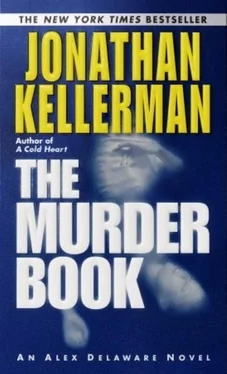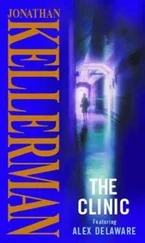O'Neill & Chapin sat in one of those cozy commercial groupings that had sprouted along the road, this one a well-shaded segment just past the center of Ojai but several miles before the turnoff to Marge Schwinn's ranch. The shop was a miniscule, shingle-roofed, clapboard cottage dominated by live oaks. The boards were painted forest green, and the store was fronted by five feet of cobblestones running from the earthen curb to Dutch doors painted creamy mint. Gold leaf lettering across the front window proclaimed:
O'Neill & Chapin, Purveyors of Fine Paper and Pigments. Est. 1986.
Behind the windows were dark, oak shutters. A sign leaning against the slats said:
On a buying trip in Europe. Back soon.
I checked out the neighboring business. To the right was the candlery, also shuttered. Then Marta, Spiritual Counselor and the Humanos Theosophic Institute. To the left was a one-story office building faced in river rock: chiropractor's office, a notary public-cum-insurance broker, a travel agent specializing in "nature-friendly excursions." Next to that, in a sunnier spot, sat an adobe cube with a wooden sign over the door.
Celestial Café.
Gold stars danced around the edges of the signs. Lights flickered behind blue gingham curtains. It was nearly 3 P.M. and I'd fed neither my brain nor my gut. Times like this, I supposed, organic muffins and herbal tea wouldn't be half-bad.
But according to the blackboard mounted above the open kitchen, the café specialized in country French food- crepes, quiche, soufflés, chocolate desserts. Real coffee, Lord amighty.
Some kind of New Age sound track- tinkly bells, flute, and harp- eased out of speakers set into the low, wood-beam ceiling. More blue gingham covered half a dozen tables. A woman with elaborately braided gray hair wearing a buckskin jacket over a crinkly, pink dress sat enjoying what looked to be ratatouille. No server was in sight, just a pasty-faced, heavyset, white-aproned woman wearing a blue bandana over her hair cutting vegetables in the kitchen. At her elbow was a six-burner Wolfe range, with one flame aglow under a cast-iron crepe pan. Fresh batter had just been poured into the pan, and the cook stopped cutting long enough to grab a towel and take hold of the handle. Tilting deftly, she created a perfect disc that she slid onto a plate, then topped with creamed spinach. A dash of nutmeg, and the crepe was rolled and placed on the counter. Then back to the vegetables.
The gray-haired woman got up and took the crepe. "Beautiful, Aimee."
The cook nodded. She looked to be forty or so, had a squashed face and downturned eyes. The hairs that had peeked out from under the bandana were light brown and silver.
I smiled at her. Her face registered no expression, and she continued chopping. I read the blackboard. "How about a mixed-cheese crepe and coffee?"
She turned around, left the kitchen through a side door. I stood there, listening to bells and flute and harp.
Behind me, the gray-braided woman said, "Don't worry, she'll be back."
"I was wondering if it was something I said."
She laughed. "No, she's just shy. Heck of a cook, though."
Aimee returned with a small wheel of white cheese. "You can sit," she said, in a very soft voice. "I'll bring it to you."
"Thanks much." I tried another smile, and her mouth quivered upward for less than a second, and she began wiping the crepe pan.
The gray-haired woman finished her meal just as Aimee brought me my plate, a mug of coffee, utensils wrapped in a heavy yellow linen napkin. She returned to her vegetables and the gray-braided woman said, "Here you are, dear," and paid her cash. No change exchanged. No credit card signs anywhere in the café.
I unfolded the napkin, looked at my plate. Two crepes.
With her back to me, Aimee said, "You only have to pay for one. I had lots of cheese."
"Thank you," I said. "They look delicious."
Chop chop chop.
I cut into the first crepe and took a bite and flavor burst on my tongue. The coffee was the best I'd had in years, and I said so.
Chop chop chop.
I was working on the second crepe when the front door opened, and a man walked in and headed for the counter.
Short, chubby, white-haired, he wore a purplish red polyester jumpsuit, zipped in front, with big floppy lapels. Crimson clogs and white socks clad stubby feet. His fingers were attenuated, too, the thumbs little more than arced nubs. His ruddy face was impish but peaceful- an elf in repose. A leather-thonged bolo tie was held in place by a big, shapeless purple rock. Flashing on his left hand was a huge, gold pinkie ring set with a violet cabochon.
He looked to be in his midsixties, but I knew he was seventy-seven because I knew him. I also understood why he wore a single color: It was the only hue he could perceive in an otherwise black-and-white world. A rare form of color blindness was one of a host of physical anomalies he'd been born with. Some, like the shortened digits, were visible. Others, he'd assured me, were not.
Dr. Wilbert Harrison, psychiatrist, anthropologist, philosopher, eternal student. A sweet and decent man, and even a murderous psychopath bent on revenge had recognized that, sparing Harrison as he conducted a rampage against the doctors he believed had tormented him.
I hadn't been spared, and I'd met Bert Harrison, years ago, trying to figure all of that out. Since then we talked occasionally- infrequently.
"Bert," I said.
He turned, smiled. "Alex!" Holding up a finger, he greeted Aimee. Without making eye contact, she poured him tea and selected an almond-crusted pastry from the glass case beneath the blackboard.
A regular.
He said, "Thank you, darling," sat down at my table, placed his cup and plate in front of him, and grasped my hand with both of his.
"Alex. So good to see you."
"Good to see you, too, Bert."
"What have you been up to?"
"The usual. And you?"
Soft gray eyes twinkled. "I've embarked on a new hobby. Ethnic instruments, the more esoteric the better. I've discovered eBay- how wonderful, the global economy in its finest form. I find bargains, wait like a child on Christmas Eve for the packages to arrive, then try to figure out how to play them. This week my project is a one-stringed curiosity from Cambodia. I haven't learned its proper name, yet. The seller billed it as a 'Southeast Asian thingamajig.' Sounds dreadful, so far- like a cat with indigestion, but I have no neighbors, per se."
Harrison's home was a purple cottage, high on a hill above Ojai, bordered by olive groves and empty fields and nearly hidden by snarls of agave cactus. Bert's old Chevy station wagon sat in a dirt driveway, always freshly waxed. Each time I'd visited, the house's front door had been unlocked.
"Sounds like fun," I said.
"It's great fun." He bit into the pastry, let loose a flow of custard, licked his lips, wiped his chin. "Delicious. What have you been doing for fun, Alex?"
Figuring out how to answer that must have done something to my face, because Harrison placed his hand atop mine and he looked like a concerned parent.
"That bad, son?"
"Is it that obvious?"
"Oh, yes, Alex. Oh, yes indeed."
I told him about Robin. He thought a while, and said, "Sounds like small things have been amplified."
"Not so small, Bert. She's really had it with my risk-taking behavior."
"I was referring to your feelings. Your anxiety about Robin."
"I know I'm being paranoid, but I keep flashing back to the last time she left."
"She made a mistake," he said. "But she bore the brunt of it, and you might think about disconnecting yourself from her pain."
"Her pain," I said. "Think it still bothers her after all these years?"
"If she allows herself to focus on it, my guess is she feels a good deal worse about it than you do."
Читать дальше












